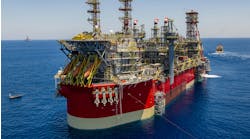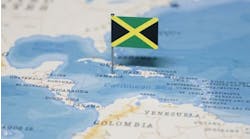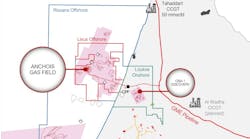FRANCE: GEP urges French contractors to 'sell' the industry to a wider audience
By Jeremy Beckman
Editor, Europe
Environmental perceptions linked to skills shortage
Victor Vachier is the CEO of GEP, the association that looks after the interests of the French oil and gas industry. Here he gives his views on a wide range of issue affecting GEP members.
Offshore: For readers unfamiliar with your organization, can you outline GEP's activities?
Vachier: GEP is an association created in 1953, with strong support from France's government, to further development of French technologies in the oil sector. At that time, there were two national oil companies, Total and Aquitaine (later to become Elf), but they were lacking expertise in certain areas. GEP was intended as a place where contractors, equipment suppliers, and service companies could meet with oil companies and the Institut Francais du Petrole (IFP).
Other important bodies with close links to GEP are AFTP and CEPM. AFTP is the French equivalent of the (Society of Petroleum Engineers (SPE), which basically looks after the needs of individuals (GEP is more for the companies). It maintains a permanent French representative at the World Petroleum Congress. Newly qualified young engineers in France tend to be attracted more to SPE, but being in AFTP has its advantages. It's a good networking venture, open to everyone in France. It also has links to similar organizations in other European countries.
CEPM stands for Comite d'Etudes Petrolieres et Marines. Many solutions used routinely in the offshore sector today have come about via this process, and more and more through the contractors. At the very least, it is an effective think-tank.
With the assistance of a super-major like TotalFinaElf, there is a long selection process to determine which new ideas are worth funding. Later on, if the projects are successful, those selected for funding must reimburse a large part of the original grant. Anyway, it is a good way of gathering specialists to identify a problem, and it does lead to creative solutions. Today's CEPM-backed studies have an emphasis on deep offshore issues, such as robotics and risers.
Offshore: Is GEP working increasingly within the framework of the European oil and gas innovation forum Eurogif?
Vachier: Yes. Eurogif operates a light structure, but the chairman, Dai Somerville-Jones (UK Energy Industries Council), is very effective. Their main objective from the outset has been to lobby the European institutions in Brussels to finance projects for the oil industry. "Of course," we tell the Commission, "you don't need to finance the big oil companies - you prefer renewable energies anyway - but there are over 300,000 people in Europe working on oilfield technologies. And if you don't look after them, the oil companies will buy technologies from outside Europe."
To convince the (European Commission) EC on this, and to involve them in our work, Eurogif has developed thematic networks. So far, we have assembled eight of these, grouping together more than 150 European contractors and suppliers. They include Intelligent Technologies, Marine Development, and CO2 Sequestration. To be considered, we have to use Brussels-speak, which means glossing over the terms "oil and gas." Nevertheless, it is a success to gather together 150 companies to talk about these issues.
Increasingly, we're trying to promote European capabilities together. At the beginning, Eurogif was promoted by associations such as GEP, IRO, EIC, TBC, and Assomineraria, with the support of Schlumberger, which has a team based in Brussels. When Schlumberger invites companies to a discussion, that helps a lot. Fugro, Saipem, and Bouygues Offshore are other heavyweight supporters. Inviting SMEs to participate fulfills a Brussels' objective, and helps our cause at the same time. Our senior consultant Jean Courjault plays an active role.
It's normal to present ourselves as European and have our companies participate in European pavilions at major offshore shows. The big contractors in France are not part of the French pavilions, now they consider themselves international. But for SMEs, it could be a good policy to present themselves in European pavilions. The fact is that combined, we are as important as the US offshore sector. American contractors account for 40-45% of global offshore supplies. Europe is not far from that, which is why Eurogif has to become the main body of the future.
Offshore: On its own, has GEP launched any new initiatives this past year?
Vachier: We have created two new committees. One, concerning the environment, is called Sustainable Growth. We try to teach our companies that they should consider not only the commercial issues of their technologies, but also potential problems affecting sustainable growth. I was amazed at a recent speech by a Shell executive. He said suppliers have to follow the Shell charter, or risk losing their contracts. True to its word, Shell has already cancelled 100 contracts.
At the moment, people see this as a constraint, but it also can provide opportunities of finding new ways of working with foreign companies. For example, pump and valve manufacturers will have to guarantee that their systems are not at risk of leaks. Recently, CGG has produced a video about safety rules. Pipelay vessels operate with different types of engines, but integrating environmental considerations must become a day-to-day concern for their owners.
For the industry to sustain itself through 2020, we must not just find oil, but also "sell" it to the public as an alternative to clean energy. We must change public perceptions concerning the environment. We are working for "clean oil" technologies.
Our other committee has been formed to look at the crisis in engineering skills. One of its tasks is developing a campaign of communication with schools in France, to show that the public image of our industry is incorrect. All our members are saying that young engineers are not attracted by the prospect of working for oil companies. Another task is to sell the industry internationally, which includes helping developing countries to train their people. IFP just signed an agreement with the University of Abu Dhabi to train more personnel from the UAE in all aspects of petroleum engineering. Increasingly, suppliers are also seeking to train "locals" in the countries where they have operations. Previously, the onus was on the oil companies only. GEP can help in this regard by acting as an "exchange" club, sharing experiences. We are working on this with IFP.
Offshore: How do you see TotalFinaElf progressing as a super-major? Do you feel it needs to keep growing through further acquisitions?
Vachier: Listening to what the chairman, Thierry Desmarest, said recently, they're not under pressure to grow. They have announced that the synergies between the three constituent companies have been much better than expected. My feeling is, they are ready to acquire again, but which company will it be? I would also keep an eye on Gaz de France, which has to be privatized after the forthcoming French elections.
Offshore: Both Technip-Coflexip and Bouygues Offshore have formed new construction ventures in the Caspian - do you regard this as a sound move?
Vachier: The Caspian is potentially a very good market. We are promoting this area to our members. Recently, we staged a seminar in Baku for Socar, and will do something similar in Kazakhstan shortly. TotalFinaElf will participate. IFP has already formed cultural links with the Kazakhs.
Offshore: The French seem to be making little headway in the Gulf of Mexico, aside from the deepwater pipelay vessel set.
Vachier: Progress has been slow, it's not a hot spot for the French. But we're also trying to convince our members that Canada is a place to go, and to find partners. Elsewhere, we had 25 French companies taking part in oil and gas shows in Iran and in Libya last year. In Egypt and Algeria, we are also planning seminars. However, it's difficult to cover all these new areas. The best prospects for the French remain in the North Sea, West Africa, the Middle and Far East.
Offshore: Can you outline some of the more important new, or continuing, offshore technology initiatives in France?
Vachier: In the last few months, under the operatorship of TFE, we witnessed French technologies coming to the four-in-four major events: the start-up of Elgin-Franklin in the North Sea, the start-up of South Pars in Iran, of Girassol, and of Syncor. This is something worth pointing out. Programs are also in progress concerning risers and drilling, assuming that in the future there will still be a link between subsea and the surface.
Offshore: Can you give examples of innovations by some of the smaller, lesser-known French companies?
Vachier: At our last annual meeting, we awarded two companies the Innovation Prize for Small Companies. One was T-Surf, which has developed software for risk management, which is being used by TotalFinaElf. Shell is also interested. Another was Metravib, which has developed a technique to identify the position of leaks in pipelines, using global positioning systems.
Offshore: How significant is the new deepwater test basin in Toulon?
Vachier: It deserves attention. The idea of having a deepwater area to do many things starts with ocean studies, which is far removed from the oil business. But operators could use this facility to test (remotely operated vehicles) ROVs and wellheads. There are a lot of potential users in the area, such as Ifremer and Cybernetix. It could also serve as a training center for ROV pilots.




